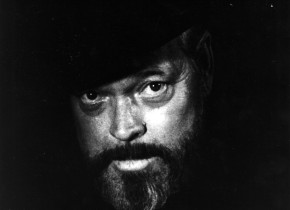Orson Welles
September 1 to 30, 2005
In the year which sees both Orson Welles' 90th birthday and the 20th anniversary of his death, the Film Museum presents the most comprehensive Welles retrospective ever shown in Austria. The programme contains his influential masterpieces with all their diversity--from his groundbreaking début Citizen Kane (1941), to the literary adaptations such as Chimes at Midnight (1966, Welles' most beautiful and personal work) to his late and unique essay films like F for Fake (1973). In addition, the show will include a large number of his “invisible” (or unfinished) works which have been preserved and restored by the Munich Film Museum. There are also films where the actor Welles was an uncredited “co-director” of the work (such as The Third Man and Black Magic), as well as several documentaries about his work.
Coinciding with the start of the Retrospective, a new Film Museum publication will be presented on September 1. "Orson Welles. Genie im Labyrinth" by Bert Rebhandl is the first Welles biography to appear in German for many years. It represents an endeavour to portray Welles as the modern artist par excellence and as a central figure of the "media century".
His standing as a filmmaker is assured; his "über-classic" Citizen Kane regularly takes first place in polls about the “Best Films of All Time”. However, Welles' persona and work are also cloaked with ambivalence: a labyrinth full of gaps and legends to which the gifted storyteller contributed a good deal himself.
As early as the 1930s, Welles had established himself as a "prodigy"; together with his theatre group, the Mercury Players, he created revolutionary stage productions and radio plays (including the famed radio version of H. G. Wells' "War of the Worlds" which triggered a mass panic when broadcast in 1938). Not long thereafter, Hollywood offered Welles the unique privilege of carte blanche for his first film project. Citizen Kane turned out to be a revolutionary work, in terms of technical innovation as well as in its modernist narrative and its critical look at American capitalism. The resulting conflict with the newspaper tycoon Hearst, who recognized himself in the figure of Charles Foster Kane, and the merely moderate success of Citizen Kane at the box office left Welles' status in Hollywood in a precarious position. He was soon perceived as an "enfant terrible".
His masterful period epic The Magnificent Ambersons (1942), unequalled to this day, was mutilated by the studio; his Brazilian project It's All True was stopped before completion, and his contract was terminated. All of this did not keep Welles from directing further exceptional films for Hollywood (three magnificent "films of darkness": The Lady from Shanghai, Macbeth and Touch of Evil). However, as of 1950, Europe seemed to be a more suitable place for Welles’ projects. As an independent artist, he shuttled between Italy, England, Spain, Germany and France, realizing a series of outstanding films with meagre means and the money he earned as an actor: Othello, Mr. Arkadin, The Trial (based on Kafka) and Chimes at Midnight (revolving around Shakespeare’s Falstaff).
Due to his piecemeal work style, many of Welles' projects were never finished, such as his re-interpretation of Don Quixote. Supposedly "minor works", often made for television, were overlooked for a long time or remained inaccessible. Yet it is only the meshing of the various formats which allows us to comprehend the modernity and complexity of his work, shaped by an all-media approach. Welles’ early experiences with radio plays, for example, were decisive for his amazing use of film sound, and his stage career determined his choice of material. The ambiguous character of his late work F for Fake, which in a certain sense represents Welles' last word on the intangibility of his own oeuvre, can already be made out in earlier films like the special trailer for Citizen Kane, as well as in the deceptively conversational tone of Portrait of Gina. And this is merely one of the threads that can been drawn through the baroque labyrinth of Orson Welles' art ...
Bert Rebhandl's critical biography of one of the few universal artists of the 20th century, "Orson Welles. Genie im Labyrinth" (in German), will be presented September 1.
